Let’s travel back to a time in the not too distant past, when young people thought they were on the cusp of a brighter future.
Elizabeth Ann Safian’s newspaper strip Karen, a wry take on the experiences of a fashionable modern miniskirted miss, caught the cusp precisely in 1968 when one of those experiences was… being spanked by her father!

And as she comes into frame, rubbing her unsittable bottom, she asks:
The humor lies in the fact that progressive young people preferred to think that spanking was a thing of the past. As far as their parents were concerned, however, it was a thing of the future. Hadn’t they seen as much in Flash Gordon?
Ten months and a day (or, from another point of view, several centuries) after Karen was catching up with the future across her pop’s knee, Star Trek‘s Captain Kirk was telling an uptight alien princess about ‘an ancient Earth custom called a spanking’.
‘It was usually administered to spoiled brats,’ he explains, but regrettably doesn’t get as far as giving a demonstration to this particular spoiled brat, played by France Nuyen.
We can begin to sharpen up the issues if we take another example from 1968, in a run of the British newspaper strip Garth entitled ‘The Time Lock’, scripted by Jim Edgar and drawn by John Allard. In this story, the strong-man hero finds himself in a future where the world is overcrowded and its tyrannical ruler, known formally as ‘Citizen One’ and informally as Annabel, is setting up a scheme to dispose of the younger, fertile population by a miniaturization program. Garth objects to what he deems an obscenity, but his views don’t count because, as a man from the past, he is considered a primitive. On the other hand, he is also considered attractive, at least by Annabel, who takes him back to Downing Street and slips into something more comfortable:
She has a proposition to offer him, which involves a job as her personal assistant, but with duties that have more to do with her as a woman.
Garth takes the view that she doesn’t need a PA. What she needs is…
Should there be any doubt about his slapping credentials, here he is with a girlfriend in a 1974 episode (art by Frank Bellamy, with modern color),
and here he is in a 1948 adventure in the lost valley of the Amazons, giving a public spanking to the villainess:
Back to the future now, where it seems that even Citizen One’s private apartments are routinely under surveillance by the security police:
This means the cops can intervene, though the bald chief Casimir deliberately takes his time about it, meaning the spanking is unnecessarily extended. So when Garth tells her to calm down, it comes with an instruction to do the impossible:
On the face of it, this is another of those time travel stories where spanking comes out of the ‘primitive’ past, a long-dead practice revived to trouble the seat of a modern woman’s panties. But now look at how Annabel reflects on the episode after Garth has been taken away to suffer the worst the police can inflict on him:
She knows exactly what has happened to her, and can put a name to it: she knows that she has not just been attacked, but spanked.
The point can be reinforced with reference to the fate of the glamorous interplanetary celebrity Dorene Arlan in Hal K. Wells’ short story ‘The White Brood’, published in Thrilling Wonder Stories in November 1940.
The girl planeteer is a public sensation for her exploits in exploration, but she breaks space law when she approaches Io, the forbidden moon of Jupiter. She is arrested by Captain Barton Reed, but gives him the slip and lands on Io anyway, forcing him to go down after her and rescue her from its perils. She is unabashed when he gets her back to his ship, and back under arrest: she has pulled off another media-friendly stunt, and she boasts of how easily she will get off the associated charges that she is to face on her return to Earth. ‘And I suppose you don’t know of any real punishment you could be made to suffer for having broken at least a dozen sensible laws,’ says Captain Reed. No, she doesn’t. But he does:
‘Our great-grandfathers had an effective way of treating spoiled brats. They spanked them.’
‘You wouldn’t dare!’ Dorene gasped. ‘I’ll have you court-martialled!’
‘You won’t have me anything. The minute you tell about being spanked, you’re going to be ridiculous. And being made ridiculous is the one thing the Glamour Girl of the Spaceways doesn’t dare to risk. Will you come and get it, or must I bring it to you?’
Bringing it to her proved to be somewhat like corralling a small but violent wildcat. He finally got the furiously squirming girl solidly across his knees. Proceedings from that point on were carried out in the methodical and thorough fashion that characterized all of Barton Reed’s undertakings.
The first smack brought tears of outraged dignity to Dorene Arlan’s eyes. Succeeding smacks brought other tears inspired by quite different emotions.
Reed finished and returned a well-spanked girl to her feet. Dorene’s tear-stained face worked for a moment. Then, to Reed’s complete surprise, she managed a trembling smile.
‘If you say that hurt you more than it did me,’ she said, ‘you’ll be nothing but a liar.’
And a romantic ending is had by both…
The point, once again, is the latent contradiction. Spanking is a long-disused disciplinary technique that Reed is bringing back to life after four generations, but it is also something that is understood not only by Dorene but also by the masses with whom she will lose credibility if the manner of her punishment should become public knowledge. Do they all, along with Captain Kirk and Annabel, have an intense antiquarian interest in the daily lives of their ancestors, or is there some other explanation?
One possibility presents itself in another British newspaper strip of the early 1970s, set in the 2170s. Scarth, written by Jo Addams and drawn by Luis Roca, might at first sound like it’s a simple rip-off of Garth, until you realize that the character of Scarth has nothing else in common with Garth, because she is the bare-bottomed blonde here:
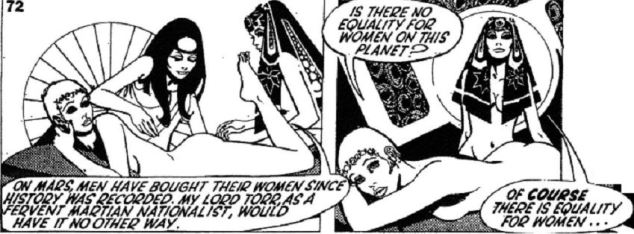
But she’s not directly relevant to the particular moment that we’re in 1971 (or 2171) to look at. She and her boyfriend Ian Scott find themselves in a matriarchal Britain, where the menfolk are kept in subjection by the carefully fostered myth that women are invincible. Ian disproves that when he takes on President Lysistrata in single combat in the arena where every British battle for supremacy reaches its climax, Wembley Stadium.
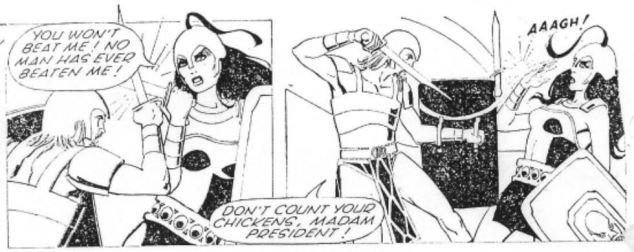
As the field of dreams becomes a field of presidential nightmares, Ian not only beats her but does something far more humiliating:
And now for the point:
‘He’s smacking the President’s bottom like that of a small child!’ Not perhaps the most elegantly phrased line ever written by Miss Jo Addams, but at least it gives the onlookers a plausible way of understanding the spanking as a particular kind of action with its own connotations, distinct from any of the other combat moves that have been deployed. In short, this is a future in which children are spanked, even if (until now) grown women are not.
The question that begs is the age-old one of when a naughty girl becomes too old to spank. In Scarth, it’s explicitly small children who are punished that way, but in Stanley Mullen’s short story ‘The Living Vortex’ (Fantastic Adventures, 1950), the implied answer is very different. Early on, the head of the weather bureau, Commissioner Apri, is discussing the headstrong behavior of his blue-haired daughter Marta:
‘Quite a girl, always up to something the minute my back’s turned. Never misses a chance to demonstrate the superiority of her sex. Resents anything a man has ever done that she hasn’t had a chance to try.’
She’s in at least her late teens, more probably early twenties, and her father goes on to remark, ‘Last time I attempted to spank her, she used judo on me.’
She has gone off hunting grull-cats in the Venusian wilderness, unaware that there is a lethal radiation storm on its way. Weatherman Jole Vardee, tasked with tracking the storm in the field, is chased by one of these deadly felines and takes refuge in a tree-house, where he finds Marta, ‘inadequately clad’ and annoyed with him for letting the cat escape – the very one she was hunting. He in turn is annoyed with her for being in the storm zone despite the official warnings.
‘I’m taking you out of here. By force, if I have to.’
Her scornful laughter stabbed his vanity. ‘I’d like to see you try…’
One sweep of a muscular arm swept Vardee aside. Marta Apri moved toward the door. He lunged at her. She tried judo, but he unwound like a steel spring. Taken by surprise, the Diana of the Tihar Forest was at momentary disadvantage. They struggled. She fought with every animal resource, biting, kicking, scratching – but Vardee was stronger than he looked. Catching her wrist, he twisted, forced her across his knee and spanked the exposed anatomy with workmanlike thoroughness.
‘You – monster!’ she screamed. ‘I’ll tell my father!’
‘I’ll tell him myself,’ Vardee panted, ‘if I ever meet him. If he hadn’t neglected this duty, you wouldn’t be such a spoiled, headstrong brat. I haven’t time to argue with you.’
Later in the story he sends a message back to base:
‘Returning by copter. Contacted female grull-cat hunter. Unreasonable woman, needed spanking. Regret necessity for forcible rescue.’
A couple more examples will help to cement the point that’s emerging, and show that we may not be approaching the issue in quite the right way. Take Chris Welkin, Planeteer, Russ Winterbotham’s long-running space adventure strip set in the 21st century. An earthbound story from 1954 concerns Helen Sanna, a scientist who holds the heroic Welkin and the timid Dave Rian against their will, using them as guinea pigs in an experiment to see if human personality can be transformed by diet. There is some apparent success in that Dave becomes aggressive towards her:
But this is actually a symptom of something else, sublimated romantic interest which comes to fruition as the story develops, albeit regrettably without Helen finding herself over his knee.
Next up, another pair of participants:

Futuristic aviator Brick Bradford was the hero of a fantasy strip by William Ritt and Clarence Gray, which started in 1933 and ran for more than half a century. A sequence from 1941 has Brick’s girlfriend, scientist’s daughter June Salisbury, stowing away aboard his super-plane in search of adventure. She disables the radio just as her father is about to refuse her demand not to be flown straight home. Brick’s response to that:

And it’s just as well he does decide to accept the fait accompli, because later on she saves his life, which rather renders a spanking out of the question.
Of course there is disappointment here, but what’s relevant to the discussion in hand is the very casualness with which the threat of spanking is treated: in these examples it’s not an echo from a distant, primitive past, just part of the ordinary repertoire of human interaction.
As a genre, science fiction tries to do a number of different things at once, and these are often contradictory or mutually incompatible. It tries to project a vision of a future that is different from the present in significant ways, which sometimes includes the idealistic notion that humanity will have outgrown spanking and think of it, if at all, the way we think about the use of leeches in medical practice. But it also tries to present authentic, relatable people in that context, whose behavior might, depending on one’s conception of human norms, include a man spanking a bad girl or the spanked girl feeling humiliated (as distinct from just sore). And sometimes, when the author isn’t maybe thinking it through clearly enough, a story will try to have it both ways.
The third thing science fiction does is to tell stories that use the future as a way of addressing themes that are of interest to the present. And that means that to us, who live in a different, and real, future, the futures that were imagined three or four generations ago can look a lot more like the past.
A good place to start is with Project Moon Base (1953), originally made as a television pilot and then bulked up to feature length. Set in the distant future of the early 1970s, the story concerns an attempt by an enemy power to destroy a US space station by infiltrating an agent who is the double of one of the scientists to be sent there. Celebrity pilot Colonel Briteis, pronounced ‘Bright Eyes’, is assigned by the White House to pilot the rocket against the wishes of the commanding officer, General Greene (Hayden Rourke). When the Colonel arrives, she’s played by Donna Martell.
It may also be of interest to see her in her space uniform. So turn around, Briteis:
During her briefing, General Greene sends everyone out of the room so that he can discuss some ‘classified matters’ with her. They then proceed to have an argument about the General’s choice of co-pilot, which turns into some home truths about how public attention has made her ‘too big for your britches’.
GREENE: One, colonels don’t say ‘no’ to generals. Two, you’re not a superwoman, you’re a spoiled brat. Three, any more guff out of you and I’ll turn you over my knee and spank you.
BRITEIS: If you do, I’ll shout the whole place down.
GREENE: I might add, this room is soundproof.
BRITEIS: You wouldn’t dare!
GREENE: You want to try me?
BRITEIS: No. No, sir.
And so the General wins the conflict of wills without the need for the briefing to turn into a ‘de-briefing’ (so to speak), nor any risk of Briteis burning like fire.
At one level, this is simply about Briteis being a brat, but it can also be (and often is) spun as a symptom of contemporary anxiety not just about the presence of women in the ‘man’s world’ of the military, but also the possibility that some at least might lack the professionalism the job requires. There’s also an implication that the usual methods of military discipline could be ineffective or inappropriate when dealing with a different gender: General Greene might have put an insubordinate man on a charge, but he might do better to put an insubordinate woman across his knee.
The point emerges even more clearly from two more examples from a decade or so either side of the film. Robert Moore Williams’ short story ‘Rocket Race to Luna’ (Amazing Stories, 1939), set in the year 2127, centers on the relationship between Captain Timothy Wayne, an ex-space pilot grounded because of eyesight problems, and the 21-year-old redheaded space-liner captain’s daughter Patricia Walsh. He is a by-the-book instructor who has been asked to teach her to fly rockets, but she has also been invited out on a flying jaunt with an intuitive and risk-taking pilot, Johnny Winston, of whom he disapproves. Wayne tells her, ‘if you go up with that reckless fool, I’ll turn you across my knee and spank you like the spoiled brat that you are!’ She turns her nose up and says she will do as she pleases.
She and Winston enter a race to break the speed record to the Moon and back, which makes her the first woman to attempt the flight. Wayne warns her of the dangers, but she rebuffs him.
The cauldron seething inside of Tim boiled over. He knew, subconsciously, that he should not do this, but he was angrier than he had ever been.
Then he was sitting on he door-step of the plane and the haughty Patricia Walsh was across his knees, face-down, and Tim’s good right hand was being applied to the seat of those riding breeches, on the spot where it would do the most good, he hoped.
The process was not so painful that she could not endure it. Physically, she was not hurt. But the shock to her dignity and pride drove her almost wild. She tried to scratch, bite, and kick, but Tim was a determined man, and the more she wiggled the more he applied the palm of his hand. When he released her, the seat of her breeches was almost smoking.
He winds up in jail charged with assault and battery, and Pat and Winston go on the Moon trip. However, they have rocket trouble on the way, and it is Patricia’s expertise, and therefore the meticulous teaching she had from Wayne, that gets them safely back to Earth. Winston admits the folly of his ways and enrolls for some training from Wayne, and Pat decides that Wayne is the one she wants to be with, even though he spanked her. In fact, she tells him to spank her again, more soundly than before, if she ever so much as looks at another rocket ship.
Rocket races aside, what makes this more than just another romance story about a relationship that proceeds through spanking to love and marriage, is the emphasis on a ‘female first’ which you can only really get in a future setting where there is something as yet unachieved by a woman that isn’t potentially going to be achieved in real life by a different woman before the story reaches the press. (You didn’t tend to get stories in a present-day setting about the first woman to win a prize-fight or build a brick wall or cross the Atlantic in a barrel.) That means Patricia is positioned much more overtly as a representative of her whole gender than bratty Briteis ever is in Project Moon Base, which makes it easier to read ‘Rocket Race to Luna’ as dealing with an advance for women collectively that is resolved with a pushback, though at least Patricia does get to show that she’s competent in a crisis as well as spankably headstrong.
There’s a similar emphasis, albeit without the romantic dimension, in a sequence of Oscar Lebeck’s newspaper strip Twin Earths, published in 1961 and set in 1972, in which astronaut Chris Cannon is sent on a trip to the Moon. He’s a late insertion into a three-person crew which also includes the mission commander Major ‘Red’ Fox and ‘astronette’ Captain ‘Cookie’ Cook, who is determined to be the first woman on the Moon.
She resents Cannon because he has balked her of her other ambition: the astronaut he displaced was Cookie’s fiancé, and she was hoping to be part of the first ever space wedding. She is out of sorts and unprofessional towards him throughout the voyage out, and as they approach the Moon, he thinks a significant thought:
On the lunar surface they find the spaceship of a previous, failed expedition. Cookie is determined to go aboard and get photographs.
Her foolhardy action causes the derelict ship to collapse, injuring Red. That puts Cannon in charge for the journey back to Earth, which obviously doesn’t please Cookie.
An exchange en route establishes three things that will become relevant:
what is said on board the ship is taped and relayed to Earth, Cookie is concerned for her reputation and Cannon is able to edit the recording before it is sent.
Cannon’s expertise gets them home, but it is a crash landing. The first thing Cookie says on arrival is to rebuke him for not making it smoother. And at that, he wastes no time in putting his earlier lunar thought into action:
But luckily for her, that’s another part of the recording he doctors: ‘That’s one detail of this trip that’ll never be publicized,’ remarks Red. So Cookie can still come out of it as the heroine of the mission.
So what are women supposed to do with their lives if they are too irrationally temperamental for daredevil space exploration? Well, get married and have babies, obviously. And that is the basis of the conflict between soldier of fortune Dan O’Keefe and Barbara Doone, the brown-eyed, copper-haired daughter of a warrior chieftain, in Peter Risk’s short story ‘Warrior’s Age’ (Astounding Science Fiction, 1942). In the post-apocalyptic world of 2942, a birth glut of one gender has led to a program of mass sterilization of women to avoid adding to the total of baby girls. (No, it doesn’t make sense to me, either.) Barbara is looking forward to becoming barren, and in the meantime she has taken a vow of chastity, to the discomfiture of O’Keefe, who wants to marry her.
The couple are on the run, and have taken refuge in a New York farmhouse. She is persuaded to exchange her warrior armor for a peasant boy’s clothes and disguise herself. In a striking inconsistency with her overall objective to avoid motherhood, her reluctance to become a ‘boy’ turns to outright rebelliousness when he orders her to make herself even more boyish by binding up her chest to disguise her breasts, and she threatens to tear off the borrowed garments.
‘I suppose you glory in seeing a chief’s daughter attired like a peasant. I suppose you think I’m humbled. I’ll show you–‘
She was about to yank the blouse apart when O’Keefe reached out and grabbed her. In almost a single motion he yanked her to him, dropped to one knee and, throwing the girl across it, slapped the bottom of her trousers vigorously.
Barbara struggled and made futile grabs for her weapons. O’Keefe found her slight body was as strong as whipcord. At her first cry of pain, O’Keefe desisted and grabbed her flailing arms.
‘Let me up, you coward! Draw your sword!’
‘This isn’t a gentleman’s way,’ gritted O’Keefe as he drew the girl’s arms up behind her in a double hammerlock, ‘but it’s effective.’
And in the end, she accepts that her future is to be one of child-bearing rather than her preferred option of celibacy – which, needless to say, is a somewhat unsatisfactory outcome from a modern point of view.
So vintage science fiction often doesn’t date well, but, being concerned with the future, it is also harder to approach with the filter of a sense of period. Many a story uses imagined visions of the far future to express a fear of the immediate future, with spanking sometimes deployed as the mechanism by which traditional values are restored. But it doesn’t all have that kind of conservative streak, at least for those who are disposed to approach it with an open mind. There can also be a simple joy in the humorously fantastical, even the bizarre, which we’ll illustrate with one last example: ‘Naughty Venusienne’ (Caper, 1956), a short story by Spencer Strong and Morgan Ives, who were actually pseudonyms for Marion Zimmer Bradley and Forrest J. Ackerman.
The tale has a strange but arresting opening line:
‘Have you ever tried to spank an invisible girl?’
Our hero is Georges Gallant, the first French astronaut to explore Venus. There he encounters N’yvonnaise, a native of the planet who is only visible when immersed in water, and who will eventually return to Earth with him to be his bride. She makes herself a bra and panties from scraps of his clothing, but habitually slips out of them whenever he tells her to do something she doesn’t want to. And she has a fiery temper which he knows he will have to break before they are married, and sets about doing after they have taken off for the return flight.
This, of course, involves the traditional method. ‘Come,’ he tells her, ‘turn yourself across my knee, and you shall learn that a man of Earth is master, even of the women he loves.’ Her answer to this charming invitation is, predictably enough, to remove the lingerie, which floats weightlessly around the spaceship. A game of catch ensues, with N’yvonnaise teasingly touching him with invisible fingers before darting away again. Finally, and almost by accident, he gets her in his grasp:
‘Now, my little wicked one,’ I tell her, ‘there will be an end to this much nonsense.’
I pull her to a chair and I bend her warm and flexible body by touch across my knees and prepare to lay on.
But hélas! There my problem was only beginning! For without the little panties, I could not see my goal! N’yvonnaise writhed and wriggled, squirming like a fish under my imprisoning arm, and when my other hand came down to spank her, as often as not I would strike myself!
So how do you spank an invisible girl? A can of talcum powder provides the solution:
And that’s science fiction for you!
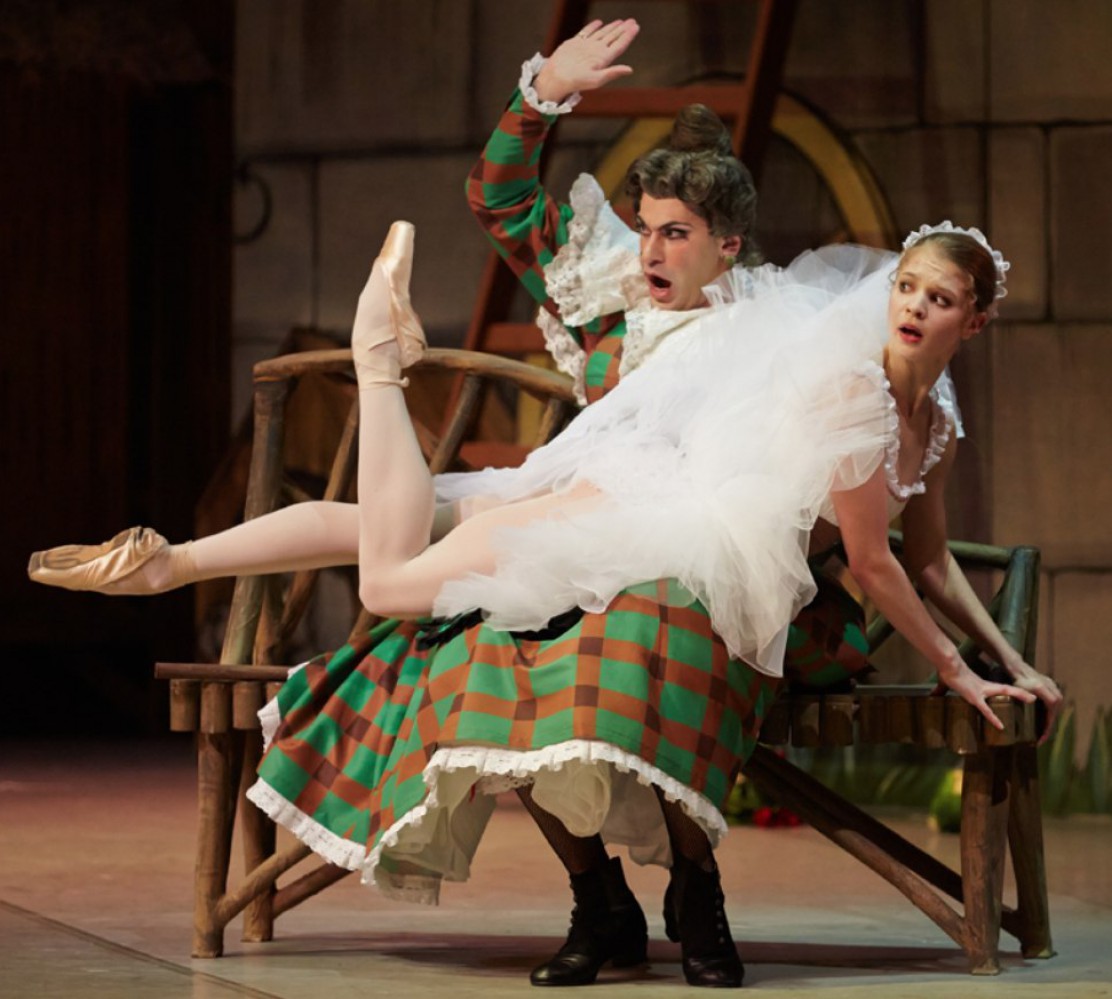





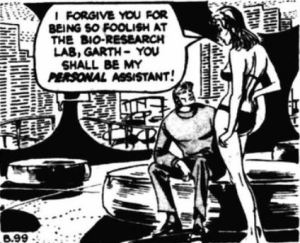



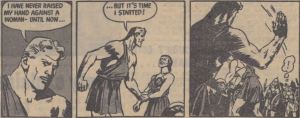














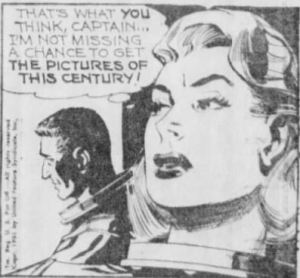




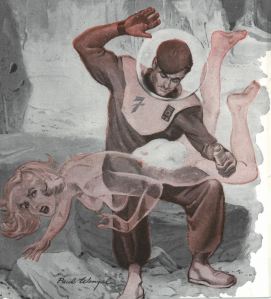
Ah, the delights of comic strip spanking, particularly Sci-Fi!
Thank you very much, Harry– I’ve been wondering for years what was the story behind the invisible behind and the Spaceman with his trusty can of bottom-revealing talcum powder! Your research, as always, amazes and delights!!
LikeLike
As always, fine stuff, much of which was entirely unknown to me. As you are no doubt aware, you might well have dedicated an entire post to the science fiction spankings authored by Robert A. Heinlein — some of them quite excellent. That said, I suspect regular readers of your blog are well acquainted with those, whereas these offerings were mostly quite obscure.
(Although the Project Moonbase item, with its excellent threat and shorts-based uniform was one I actually saw a few times as a young man, as that movie seemed to be in regular rotation on Saturday afternoons.)
LikeLike